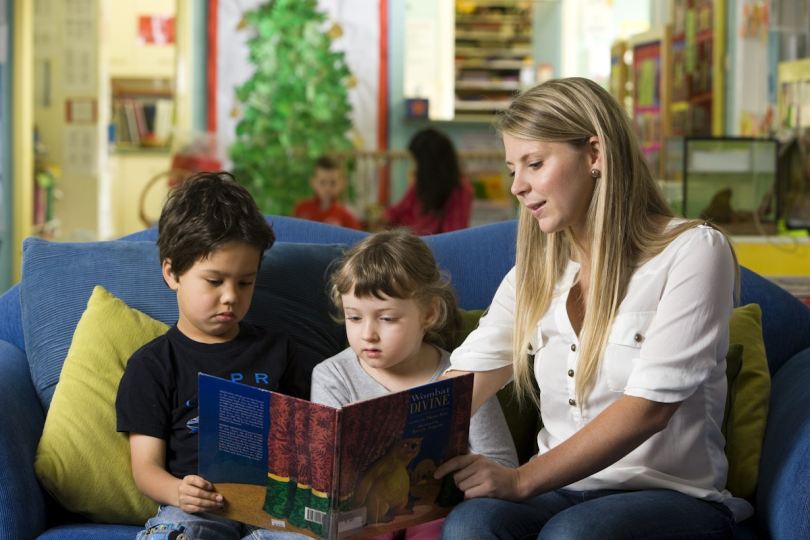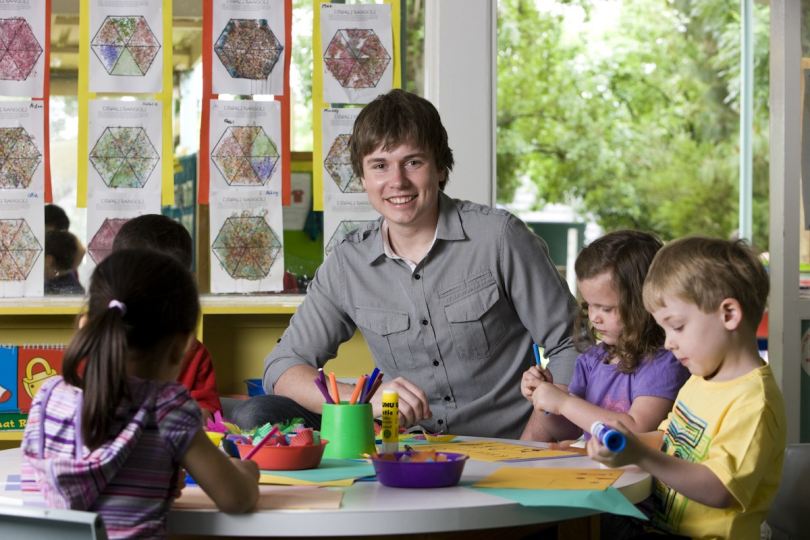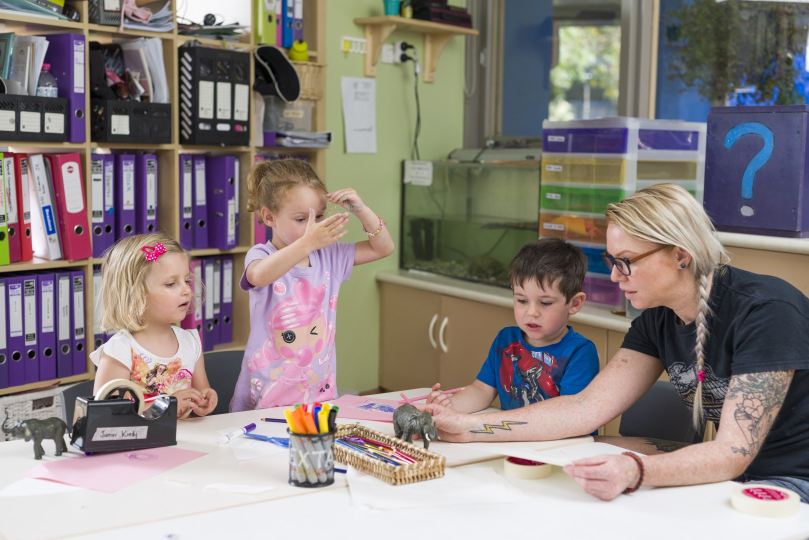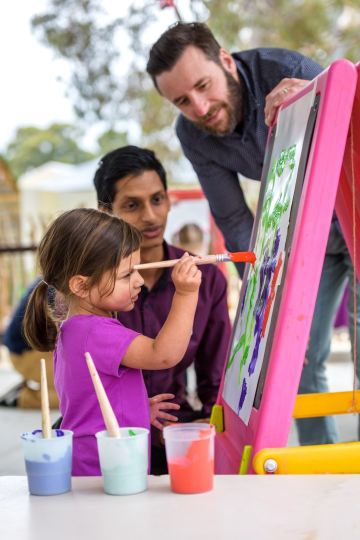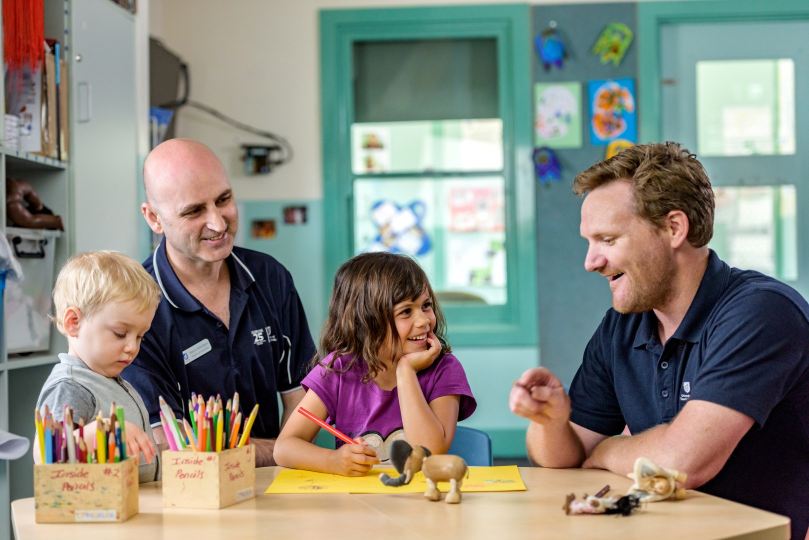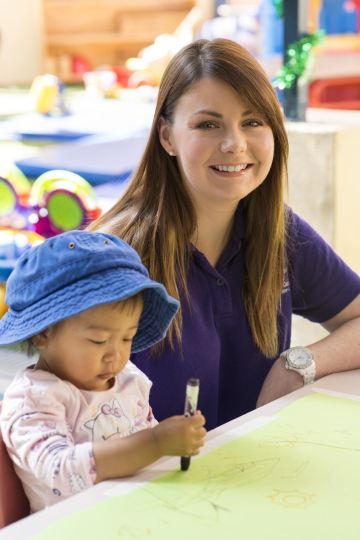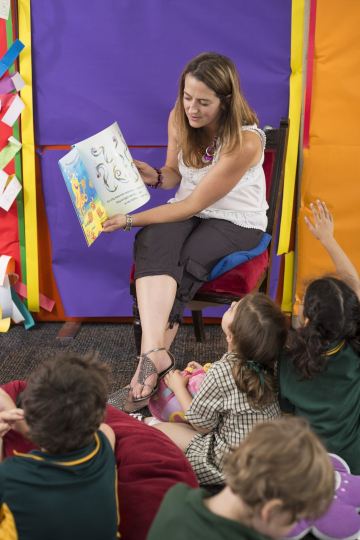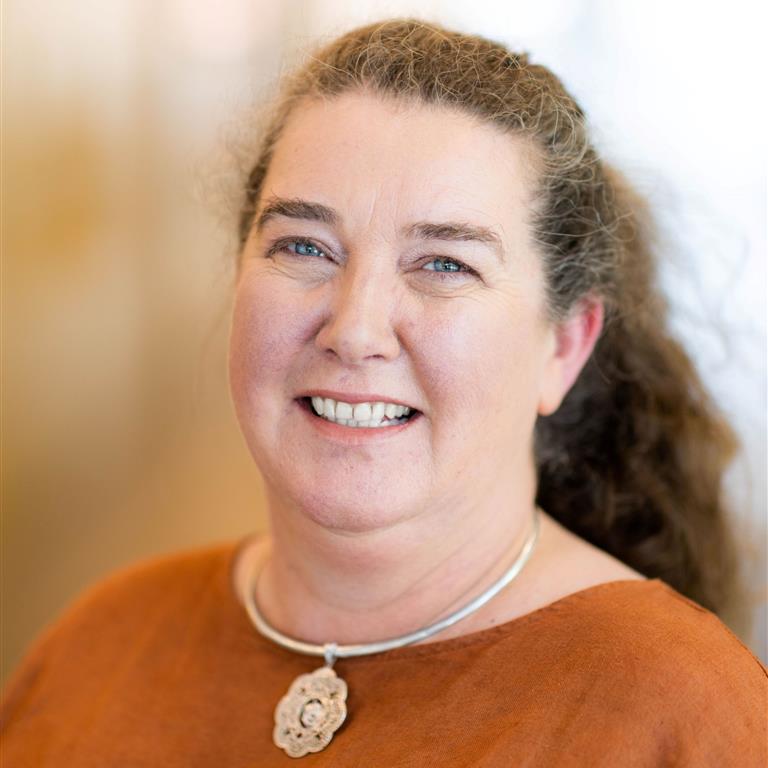Master of Teaching (Early Childhood)
Degree Level Postgraduate
Year 2024
You're considered an International student if you are:
Degree Level Postgraduate
Year 2024
Program Code
MMET
Fees
AUD$ 33,500 per annum (per 1.0 EFTSL) for students enrolled in 2024
International Admission by Country
See full entry requirements
CRICOS Code
077214E
Applicants must have completed:
Critical information regarding Learning Areas entry requirements can be found here.
-----Additional entry requirements-----
In accordance with national teacher education program standards, applicants must also fulfil non-academic entry requirements. All applicants will be required to submit a 400-600 word Teaching Capabilities Statement with their SATAC application. Complete information on content, format and submission is available here.
Applicants are advised that a successful Working with Children Check (WWCC) with the Department of Human Services is required for all preservice teachers prior to undertaking any professional experience placement or site visit that involves contact with minors (under 18 years of age). Information on the procedure to be followed for obtaining clearance can be found on the Professional Experience Placement website.
---------------------------------------------------------------------
To be eligible for Master of Teaching (Early Childhood) with 1 year of Advanced Standing applicants must have completed an Initial Teacher Education degree (i.e. Bachelor of Teaching or three-year Diploma of Teaching) in the field of Early Childhood or Primary teaching. Additionally, applicants must be eligible for teacher registration in an Australian state or territory and have completed a minimum of two years full-time employment as an early childhood teacher (children ages 0-5 years) or two years full-time employment as a junior primary or primary school teacher (children ages 5-8 years) in Australia within the last five years. Applicants eligible for 1.0 EFTSL of advanced standing complete the program in 1 year of full-time study or equivalent part-time study.
12023 THE Subject Rankings
2Results for Specialist Studies in Education - 2018 Excellence in Research for Australia (ERA).
This industry-relevant postgraduate qualification is for students who have already completed a three-year bachelor’s degree and would like to increase their employment prospects with an early childhood qualification.
The curriculum is practical in nature and is solely focused on the education of children from birth to eight years of age. Practical learning is a major component and you will complete three supervised placements in childcare, preschool/kindergarten and junior primary schools, totalling 85 days.
The Early Childhood specialisation is taught at the Magill campus only.
Advanced Standing
You may be eligible for Advanced Standing and complete the requirements of this qualification in one year. Please see the entry requirements for further details.
When applying through SATAC, please refer to the following codes. If you are uncertain about your eligibility for Advanced Standing, please include more than one SATAC code in your list of application preferences.
Please note that this degree cannot be studied 100% online. Most courses are delivered in a blended mode; with a mixture of online and on-campus components. Some courses offered a fully online delivery.
WWCC clearance
Preservice teachers will be required to undertake a Working with Children Check (WWCC) through the Department of Human Services (DHS). The clearance will be valid for five years. The WWCC must be completed prior to being accepted for a placement and can take up to six to eight weeks to be processed. Strict confidentiality is maintained during the DHS clearance process. If a preservice teacher fails to obtain clearance for any reason, the University cannot accept responsibility for obtaining a professional experience placement or any other professional experience activity that a preservice teacher may require to complete the course of study. If preservice teachers cannot undertake a professional experience placement or any other professional experience activity which is a compulsory part of the program, they cannot graduate with an Initial Teacher Education degree from UniSA.
Mandatory child-safe environments training.
All education students who are completing any in-school or site (i.e. preschools and childcare settings) observations, activities or professional experience placements must undertake mandatory training in Responding to Abuse and Neglect prior to the commencement of the activities or placements. In South Australia, child protection legislation and policy require all organisations to establish and promote child-safe environments. Mandatory reporting of child abuse and neglect training is required of all individuals working with children and young people. All undertaking professional experience placements in South Australian government and non-government schools and preschools must provide documented evidence (i.e. a certificate) that shows they have completed all the required training from one of the providers mentioned on the following website.
Literacy and Numeracy Test
All preservice teachers must meet the required standard in the national Literacy and Numeracy Test for Initial Teacher Education (LANTITE) to be eligible for program completion and graduation. Preservice teachers will attempt LANTITE as they progress through their program. Preservice teachers will be required to successfully achieve both the literacy and numeracy components of LANTITE as a prerequisite for enrolment in their final Professional Experience Placement course. The University will provide a range of supports for preservice teachers to help them achieve the required standard. Preservice teachers will be allowed three attempts at each test. Any preservice teacher who fails to meet the standard on three occasions in either the literacy or numeracy test will be counselled regarding options.
Please note new entry requirements and learning area specialisations.
This degree has been designed to develop skilled, committed and flexible early childhood educators.
The focus is on practical learning, particularly relating to the principles and concepts relevant to early childhood development and learning. You will focus on four major areas:
You will also study mandatory courses in:
Courses studied will include on-campus lectures and workshops; some courses will also be offered fully online or with online support. Learning will be supplemented with online lectures, learning activities, readings and discussion boards.
During the degree you will participate in four supervised placements in childcare, preschool/kindergarten and junior primary schools, totalling 80 days.
We are South Australia's largest tertiary provider of education degrees. Practical learning is a major focus and you will gain industry experience starting in your first semester.
As Australia’s university of enterprise:
Our commitment to research with an industry focus is unprecedented in South Australia. In the 2018 nationwide Excellence in Research for Australia evaluation, 100 per cent of our assessed research was rated world-class or above2. It’s a very good time to choose UniSA for your postgraduate study.
1Ranked #52, 2023 THE Young University Rankings.
2Results for Specialist Studies in Education - 2018 Excellence in Research for Australia
Hear from Steven and Karen as they share their experiences studying Early Childhood Education at UniSA.
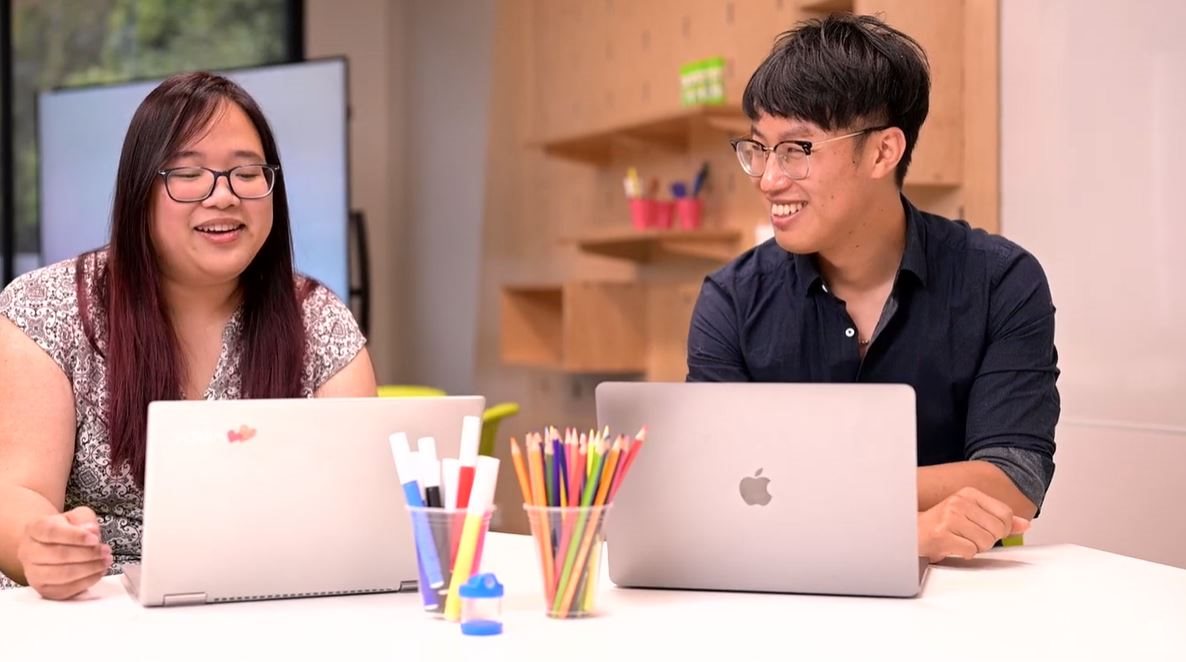
If you want to make a difference, have an interest in childhood development, and have the patience, warmth, integrity and communication skills needed when working with young children, this master’s degree may be for you.
This specialised teaching field shows promising job prospects, with very strong growth in Australia1. Careers to consider:
1Australian Government, National Skills Commission, Job Outlook 2020.
Successful completion of this program provides a recognised academic qualification which will enable graduates to apply for teacher registration in South Australia, interstate and some overseas countries. Applicants should note there are other criteria determining eligibility for registration by the Teachers Registration Board of South Australia and other registration and regulatory authorities. Applicants are advised to check registration requirements as they are subject to change.
This program has been approved by the Australian Children's Education and Care Quality Authority (ACECQA) as an Early Childhood Teaching Qualification for the purposes of the Education and Care Services National Law.
How to apply for international students will give you helpful information about the application process at the University of South Australia. When you are ready, apply through our International Application System. If you would like to talk to someone near you about studying at the University of South Australia, we have agents all over the world who can assist you. Find an Education Agent in your country.
-----Additional entry requirements-----
In accordance with national teacher education program standards, please note that as part of your application, you are also required to meet non-academic entry requirements.
All applicants who wish to commence study in our Education degrees are required to submit a 400-600 word Teaching Capabilities Statement with their application. This supports the national priority to ensure those entering the teaching profession have the personal qualities to best support learners and graduate as classroom ready, high quality teachers.
The Teaching Capabilities Statement complies with the national Australian Institute for Teaching and School Leadership (AITSL) initial teacher education program standard of academic and non-academic entry requirements. Further information can be found on the Entry Requirements page.
Every year, over 2,500 UniSA students are supported in their studies through scholarships and grants worth millions of dollars. Check out the scholarships below. One of them may be perfect for you. Visit our scholarships page for more.
Recipients can get a 50% reduction on tuition fees for up to four years of full-time study for selected degrees.
Recipients can get a 15% reduction on tuition fees for the duration of their chosen degree.
As a UniSA student, you will have unique access to work placement opportunities, overseas study tours and exchanges, networking events, internships, guest speakers and more.
Our campuses are equipped with state-of-the-art facilities including modern lecture theatres, libraries, workshops and laboratories, as well as spaces that simulate real work environments. These are all supported by the latest technologies and a 24/7 online learning platform. We have health services on campus, gymnasiums, technology zones and great student lounges. You will also gain access to a range of community clinics, which provide professional and cost effective services in areas of health, business, law and psychology. There are campus sport activities to keep you active, and if you are keen to explore the social side of university life, there are movies, cooking demonstrations, parties and lots more.
Adelaide also has a variety of accommodation options to suit different requirements and budgets. Options include dedicated student accommodation and private rentals. See our long-term accommodation pages, or explore our student accommodation by Scape on Bank Street in Adelaide’s lively cultural precinct, an ideal location for students. It is within easy reach of UniSA’s city and metropolitan campuses, Rundle Mall shopping, the Central Market, Chinatown, and the West End’s vibrant nightlife. It is also across the road from the Adelaide train station, and on bus and tram routes.
My vision is to work collaboratively to equip graduates with qualities that promote learner achievement and wellbeing, which transfers to productive citizenship.
There are a number of ways to apply to study UniSA's undergraduate and postgraduate coursework degrees.
You can access our online International Application System through our How to Apply page. The International Application System is an easy and secure online application and acceptance process. You will have visibility of your application through the secure online portal with the ability to download offer documents, submit your acceptance and make a payment.
Alternatively you can submit an application through one of the University's registered Education Agents.
If you are completing an Australian year 12 qualification in Australia or overseas, or the International Baccalaureate (IB) Diploma Programme in Australia, you must apply through SATAC http://www.satac.edu.au/.
If you are applying for the UniSA Study Abroad or Study Abroad Plus program, you can submit your application online here.
Postgraduate study by research
For information on applying to do postgraduate study by research, including Masters by Research, PhDs or Doctorates, please visit http://unisa.edu.au/resdegrees.
There is no closing date for submitting your application however the admissions process takes between one and three weeks from the date that we receive your application and all required supporting documentation.
If you are completing an Australian year 12 qualification in Australia or overseas, or the International Baccalaureate (IB) Diploma Programme in Australia, you must apply through SATAC. Key dates for applications can be found here.
You may be eligible to receive credit or advanced standing for your chosen UniSA degree based on your previous studies, if they are in a related area at an equivalent or higher level. Receiving credit will reduce the number of courses you undertake within the degree, and may also reduce the overall duration of your degree.
The amount of credit you may be eligible to receive is assessed on a case-by-case basis by the Admissions team.
The best way to determine your eligibility to receive credit or advanced standing is to apply using our International Application System which can be found on our How to Apply page. You will need to supply detailed syllabus documents with your application.
UniSA welcomes the opportunity to speak with you regarding your study options. Our staff are able to talk to you about degree information, career outcomes and pathways, entry requirements, applications, and student life, so that you are able to make the best study decision for your future.
Click here to book a 1:1 appointment with one of our enquiries team.
We also have many events throughout the year in Australia and overseas where you can speak with UniSA representatives about your area of interest. View our calendar of events in your home country by selecting the 'International' filter.
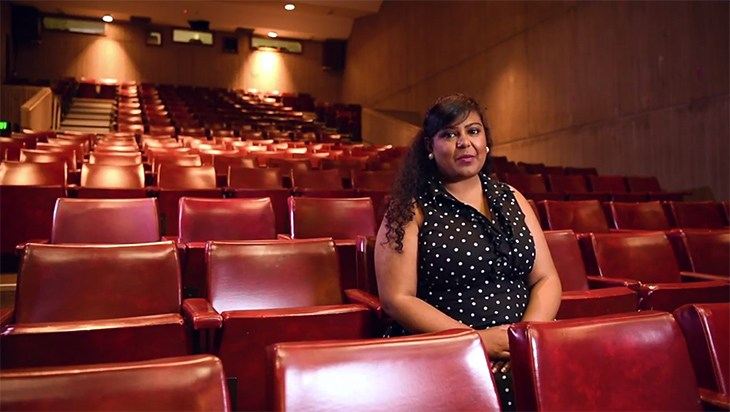
Hear from Jean as she shares her experiences studying a Master of Teaching at UniSA and her journey as a Bachelor of Arts graduate.
